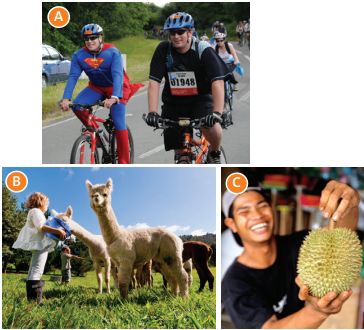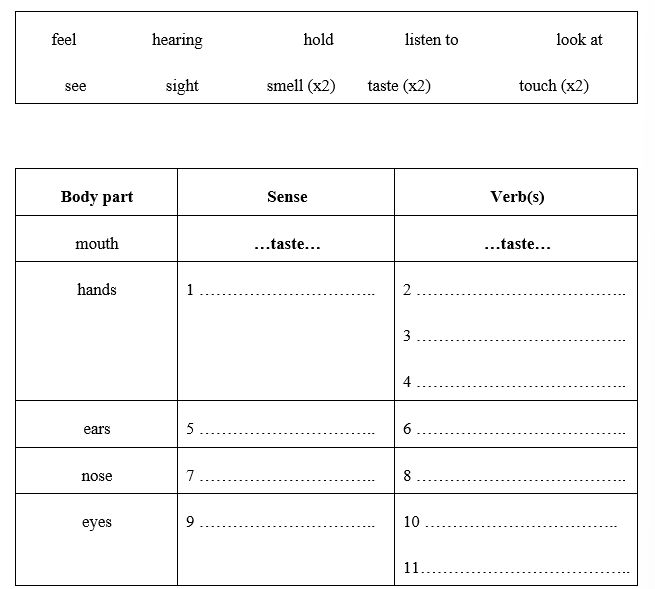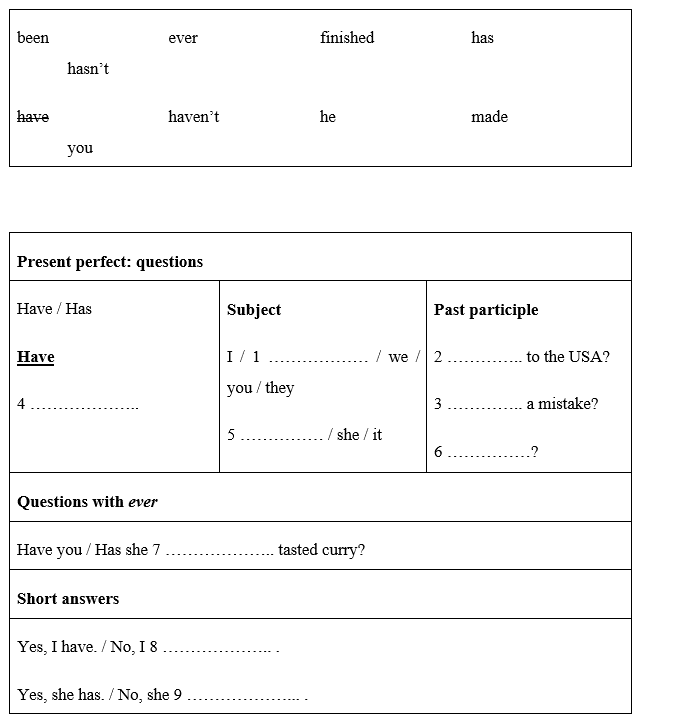Giải SGK, SBT Unit 2. Sensations Friends Plus
Giải SGK, SBT Unit 2. Sensations Friends Plus
2. Read the magazine quiz and complete the table with the words in blue. Listen and check.
(Đọc câu đố tạp chí và hoàn thành bảng với các từ màu xanh lam. Nghe và kiểm tra.)
|
Hearing |
Sight |
Smell |
Taste |
Touch |
|
sound |
|
|
|
|
What's your strongest sense?
Are you a visual person, who likes looking at things? Perhaps you prefer to use your sense of hearing and listen to things? Do our quiz and make a note of your choices to see which senses are most important to you.
1. You are in a restaurant and you ask the waiter to bring you the most unusual dish on the menu. When the dish arrives, what do you do first?
- Smell it.
- Feel it.
- Look at it closely.
- Ask someone about it.
- Taste it.
2. Which two of these things do you prefer?
- The taste of a delicious meal
- The sight of a beautiful sunset
- The smell of flowers in the summer
- The feel of a warm bed on a winter's night
- The sound of beautiful music
3. What do you think about books?
- I like to hold and smell them when they're new.
- I like the covers and photos.
- I really like recipe books. I can almost taste the food when I read them.
- I prefer audio books or listening to stories.
4. Choose the two conditions which you think are most difficult.
- Colour-blindness, when you can't see some colours.
- Tone-deafness, when you can't sing or play instruments very well because you don't have a 'good ear'.
- ‘Anosmia', when you can't smell anything or taste very little.
- Losing sensation in some of your toes or fingers.
5. Which two of these activities do you prefer to do to relax?
- Watch TV
- Have a warm drink
- Listen to music
- Exercise and then have a shower or a bath
5. USE IT! Work in groups. Ask and answer the questions. Use some of the key phrases.
(Làm việc theo nhóm. Hỏi và trả lời câu hỏi. Sử dụng một số cụm từ khóa.)
1. What are your favourite sights, sounds and tastes? What do they remind you of?
(Khung cảnh, âm thanh và mùi vị yêu thích của bạn là gì? Chúng nhắc bạn nhớ về điều gì?)
2. What are your least favourite sights, sounds and tastes? How do they make you feel?
(Khung cảnh, âm thanh và mùi vị bạn ít yêu thích nhất là gì? Chúng làm bạn cảm thấy như thế nào?)
3. Is there anything that you like or don't like to feel or touch? Why?
(Có bất kỳ thứ gì mà bạn thích hoặc không thích cảm nhận hoặc chạm vào không? Tại sao?)
|
KEY PHRASES (Cụm từ khóa) Talking about likes and dislikes (Nói về thích và không thích) What are your favourite...? (Sở thích… của bạn là gì?) It reminds me of ... (Nó làm tôi nhớ đến…) I love... (Tôi yêu …) Is there anything that you don't like...? (Có điều gì mà bạn không thích …?) Are there any... that you dislike? (Có bất kỳ … gì mà bạn không thích …?) I hate / can't stand.... (Tôi ghét / không thể chịu được …) |
1. Read the article. Then complete the headings for paragraphs A-C with the words in the box.
(Đọc bài viết. Sau đó hoàn thành các tiêu đề cho các đoạn A-C với các từ trong hộp.)
|
distance food memory nose smell |
A. Scent and …
B. Training a …
C. Life without ...
Follow your nose...
Meet three people whose sense of smell has made a difference to their lives.
A. Helen Keller - a famous activist - was deaf and blind herself. With an extraordinary sense of smell, she could identify people's jobs by the odour on their clothes. ‘When a person passes’, she said, 'I get a scent impression of where he has been’. For her, a smell can remind us of another time and place.
B. James Bell has worked for a perfume company for over twenty years. He says, 'To develop a superior sense of smell, you must train it, like a concert pianist’. After passing a 'smell test', James studied perfumery in France, where he learned to recognise about 2,800 synthetic and 140 natural materials. Since then he has helped to create the world's favourite fragrances.
C. Journalist Lucy Mangan has been anosmic since birth. So she can't smell anything, even the fragrances of roses. She has never tried different perfumes in a shop. As 75-95% of the food flavour comes from its smell, meals haven't had much flavour. Although she can feel the different textures of lasagne, steak or fish, they're all quite tasteless.
Present perfect: affirmative and negative
(Quá khứ hoàn thành: khẳng định và phủ định)
1. Cover the article on page 20. Complete the sentences with the words in the box. Then check your answer.
(Che bài viết ở trang 20. Hoàn thành các câu với các từ trong hộp. Sau đó kiểm tra câu trả lời của bạn.)
|
had helped smelled tried |
1. He has ________ to create fragrances.
2. She has ________ anosmic since birth.
3. She has never ________ different perfumes.
4. Meals haven't ________ much flavour.
2. Read the sentences in exercise 1 again. Then choose the correct words to complete the rules.
(Đọc lại các câu trong bài tập 1. Sau đó chọn những từ đúng để hoàn thành các quy tắc.)
|
RULES 1. The present perfect describes life experiences or recent events that started/ finished in the past and continue up to the present. 2. We form the present perfect with be/ have and a past participle. 3. Regular/Irregular past participles end in -ed. 4. We use not or never to make affirmative / negative sentences. |
4. Read the Study Strategy. Complete the sentences using the present perfect form of the verbs.
(Đọc Chiến lược học tập. Hoàn thành các câu sử dụng dạng hiện tại hoàn thành của động từ.)
|
not begin buy not eat not see speak |
1. You _______ any breakfast!
2. We _______ a lot of English today.
3. I _______ that film. Is it good?
4. The match _______. It starts in ten minutes.
5. She _______ a fantastic new bike.
|
STUDY STRATEGY (Chiến lược học tập) Learning irregular verbs (Học các động từ bất quy tắc) - Check irregular verbs in a dictionary. (Kiểm tra động từ bất quy tắc trong từ điển.) - Revise them and test yourself every week. (Xem lại chúng và tự kiểm tra mỗi tuần.) |
7. USE IT! Talk about experiences using the present perfect. Use the time expressions below.
(Nói về những trải nghiệm sử dụng thì hiện tại hoàn thành. Sử dụng từ thể hiện thời gian bên dưới.)
|
always for weeks never since this year today |
A: I have never visited Hue.
(Tôi chưa từng đến thăm Huế.)
B: I haven't watched TV for weeks.
(Tôi không xem TV trong nhiều tuần.)
Present perfect: questions
(Hiện tại hoàn thành: các câu hỏi)
1. Complete 1-5 with the words in the box. How do you say ever in Vietnamese?
(Hoàn thành 1-5 với các từ trong hộp. Bạn nói “ever” trong tiếng Việt như thế nào?)
|
ever have haven't has hasn't |
1. Have you ________ ridden a horse?
2. No, I ________.
3. ________ you guys been to a theme park?
4. ________ your brother been on a rollercoaster?
5. No, he ________.
2. Read the sentences in exercise 1 again. Then choose the correct answer to complete the rule.
(Đọc lại các câu ở bài tập 1. Sau đó chọn câu trả lời đúng để hoàn thành quy tắc.)
|
RULE (Quy tắc) We use questions in the present perfect to ask... (Chúng ta dùng câu hỏi ở thì hiện tại hoàn thành để hỏi...) a. if a person experienced something at some time. (nếu một người trải nghiệm một điều gì đó trong một khoảng thời gian dài.) b. an exact time when a person experienced something. (một thời điểm chính xác khi một người trải nghiệm một cái gì đó.) |
2. Cover the dialogue and complete the Key Phrases. Watch or listen again and check.
(Che đoạn hội thoại và hoàn thành các Cụm từ Khóa. Xem hoặc nghe lại và kiểm tra.)
|
KEY PHRASES Making plans for free time I've heard it's a bit 1……. . It doesn't sound 2……. to me… What do you fancy 3……. ? Can't we 4……. ? Why not try 5……. ? I think 6……. |
6. USE IT! Work in pairs. Read the situation. Then prepare and practise a new dialogue. Use the key phrases and the dialogue in exercise 1 to help you.
(Làm việc theo cặp. Hãy đọc tình huống. Sau đó chuẩn bị và thực hành một đoạn hội thoại mới. Sử dụng các cụm từ chính và đoạn hội thoại trong bài tập 1 để giúp bạn.)
|
Student A: You want to go camping in the countryside at the weekend. Listen to what your friend suggests instead and respond. (Học sinh A: Bạn muốn đi cắm trại ở nông thôn vào cuối tuần. Thay vào đó, hãy lắng nghe những gì bạn của bạn gợi ý và phản hồi.) |
|
Student B: You don't want to go camping in the countryside at the weekend. You fancy watching a film then having dinner. Suggest what type of film and food you want. (Học sinh B: Bạn không muốn đi cắm trại ở nông thôn vào cuối tuần. Bạn thích xem một bộ phim sau đó ăn tối. Đề xuất loại phim và món ăn bạn muốn.) |
4. Read the key phrases and find them in the Experience the Mekong Delta in Southern Việt Nam text. Think of how to complete the first two phrases about your town.
(Đọc các cụm từ khóa và tìm chúng trong bài viết Trải nghiệm đồng bằng sông Cửu Long ở miền Nam Việt Nam. Nghĩ cách hoàn thành hai cụm từ đầu tiên về thị trấn của bạn.)
|
KEY PHRASES (Cụm từ khóa) Expressing recommendations (Bày tỏ lời gợi ý) Don't forget to try..... (Đừng quên thử…) It's one of the most... in the.... (Nó là một trong những … nhất.) It's quite an experience. (Đó là một trải nghiệm.) They're (all) worth seeing. (Chúng đều đáng xem.) We're looking forward to (seeing you). (Chúng tôi rất mong đợi gặp bạn.) |
5. USE IT! Follow the steps in the writing guide.
(Thực hiện theo các bước trong hướng dẫn viết.)
|
WRITING GUIDE (Hướng dẫn viết) A. TASK (Nhiệm vụ) Write an entry for the “You haven't lived until...” competition. Use information about a place you like and know well. Include some of the key phrases. (Viết một bài dự thi cho cuộc thi “Bạn chưa từng sống cho đến khi...”. Sử dụng thông tin về một địa điểm mà bạn thích và biết rõ. Bao gồm một số cụm từ chính.) B. THINK AND PLAN (Suy nghĩ và lên kế hoạch) Brainstorm ideas and decide whether they belong in the paragraph on sights, sounds, tastes or feelings. (Lên các ý tưởng và quyết định xem chúng có thuộc đoạn văn về hình ảnh, âm thanh, mùi vị hay cảm xúc hay không.) C. WRITE (Viết) Use your notes from B to write a first draft of your description. (Sử dụng ghi chú của bạn từ B để viết bản nháp đầu tiên cho mô tả của bạn.) D. CHECK (Kiểm tra) - adjectives and intensifiers (tính từ và từ nhấn mạnh) - ordering your ideas in a logical way (sắp xếp ý tưởng của bạn một cách hợp lý) |
CÁC BÀI TẬP KHÁC
















